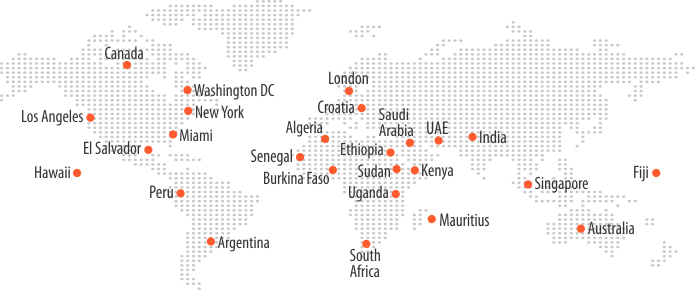Wholesale VoIP Rates Explained: Key Factors Influencing Pricing and Market Forces

As the market expansion of VoIP grows at an explosive rate, competitive pressure is building in an increasingly complex telecom arena. For carriers, choosing the best VoIP termination partner with business-friendly Wholesale VoIP Rates is a crucial choice that will have an immediate and long-term impact on the success of their organizations.
Within the VoIP ecosystem, Wholesale VoIP Termination Rates are crucial for carriers and service providers who facilitate the exchange of voice traffic between networks. Let’s delve into the intricacies of Wholesale VoIP and explore the key factors that influence their pricing and the market forces that drive the VoIP landscape.
Wholesale VoIP Rate: Its Importance and What it is?
The size of the global Voice Over Internet Protocol (VoIP) market was estimated at USD 40.2 billion in 2022, and it is anticipated that it will increase to USD 108.5 billion by 2032. When it comes to promoting the use of this technology and preserving a thriving industry, wholesale VoIP termination rates are essential. First, wholesale VoIP provides enterprises of all sizes with an affordable communication solution.
Businesses can dramatically lower communication costs by eliminating the requirement for pricey standard phone lines and related infrastructure. With the help of wholesale rates, service providers can charge resellers competitive rates, ensuring that VoIP services are accessible to end customers across a range of businesses.
Additionally, by charging wholesale rates, service providers can successfully control their profit margins while meeting changing customer demands. Offering reasonable wholesale pricing is crucial for service providers trying to entice resellers and increase their client base as the telecoms sector gets increasingly competitive.
VoIP becomes even more enticing for companies looking for dependable and economical communication solutions because wholesale providers can pass on these benefits at lower prices thanks to their lower operational expenses due to economies of scale. A cutting-edge business strategy using advanced voice-over IP technology is wholesale VoIP.
Its affordability makes it a desirable choice for companies looking for effective communication solutions, and thanks to economies of scale, service providers are able to charge reasonable costs. We will examine the numerous variables affecting VoIP rates as we learn more about this subject and how they affect this dynamic market.
Key Factors Influencing Wholesale VoIP Rates
Call Volume and Capacity
The volume of voice traffic handled by a wholesale VoIP provider directly impacts its pricing structure. Carriers with larger capacities and the ability to manage higher call volumes can offer more competitive rates to their clients. Scalability and network efficiency are thus vital for cost optimization. Providers with extensive global reach can leverage economies of scale to negotiate better rates with their interconnection partners.
Geographical Location
The geographic location of the termination points significantly affects wholesale VoIP termination rates. International calls, for instance, tend to be more expensive due to the intricate nature of interconnecting with various global carriers. Regulatory fees and taxes imposed by different countries can also influence pricing. The cost of terminating calls to certain countries may be higher due to government-imposed levies and infrastructure expenses.
Quality of Service (QoS)
VoIP call quality is crucial for end-users, and providers must invest in high-quality infrastructure to ensure reliable service. Wholesale VoIP termination rates may be adjusted based on the quality of service (QoS) offered, with superior networks commanding higher prices. Carriers that can guarantee low latency, minimal packet loss, and high voice clarity can charge a premium for their services.
Interconnection Agreements
Wholesale VoIP providers often engage in bilateral agreements with other carriers to facilitate call termination. The terms of these interconnection agreements, including call volumes, quality standards, and settlement processes, can impact the overall pricing structure. Negotiating favorable agreements and mutually beneficial terms with interconnection partners can lead to competitive pricing for wholesale VoIP services.
Seasonal Demand
Like any industry, VoIP experiences fluctuations in demand throughout the year. During peak seasons or holidays, call volumes may surge, and providers may adjust their wholesale rates accordingly to maintain quality service. Additionally, providers may offer incentives or discounts during off-peak periods to encourage traffic routing through their networks.
Competition
The VoIP market is highly competitive, with numerous carriers vying for a share of the market. Intense competition exerts pressure on pricing, driving providers to offer competitive wholesale rates to attract and retain customers. Wholesale VoIP providers continuously monitor market trends and competitive offerings to remain agile and responsive to changes in the industry.
Market Forces Shaping VoIP Rates
Technological Advancements
As VoIP technology continues to evolve, it enables more efficient call routing and cost-effective solutions. Wholesale VoIP providers must stay abreast of technological advancements to optimize their operations and remain competitive in the market. Innovations such as software-defined networking (SDN) and voice compression technologies can significantly impact the costs associated with call termination, influencing wholesale VoIP pricing.
Regulatory Environment
The VoIP industry is subject to various regulations, which can differ significantly from one country to another. Changes in regulatory frameworks, such as the imposition of new taxes or the introduction of net neutrality laws, can impact VoIP rates. Providers need to closely monitor and adapt to evolving regulatory landscapes to ensure compliance while managing costs and pricing structures.
Shifts in Consumer Behavior
Consumer preferences and behaviors influence the demand for VoIP services. The rise of remote work, for example, has led to an increased reliance on VoIP for communication, affecting the overall call volumes and, consequently, the wholesale rates. Providers must remain responsive to changes in user behavior and adapt their pricing strategies accordingly.
Economic Factors
Economic conditions and currency fluctuations can influence wholesale VoIP rates, particularly for international calls. Providers may need to adjust their pricing in response to economic uncertainties. Currency exchange rates can influence the cost of interconnection with international carriers, leading to potential fluctuations in wholesale rates.
Mergers and Acquisitions
Consolidation within the telecommunications industry through mergers and acquisitions can alter the competitive landscape and potentially lead to changes in wholesale VoIP rates. Merged entities may negotiate new agreements with interconnection partners, affecting pricing and market dynamics.
Connecting the World, One Voice at a Time – Redefine Wholesale VoIP Termination with Bankai Group!
Wholesale VoIP plays a vital role in seamless communication across the globe. As businesses and individuals embrace the transformative benefits of Voice over Internet Protocol, it is imperative to understand the key factors that influence pricing and the market forces that drive the industry. In this journey of connectivity, Bankai Group emerges as a leading force, empowering carriers and service providers to unlock the full potential of Wholesale VoIP Termination.
As we conclude this exploration of Wholesale VoIP Rates and the influential market forces, we invite you to experience the power of Bankai Group. At Bankai Group, we recognize that Wholesale VoIP Rates are not just about numbers; they are about connecting people, businesses, and ideas. As a global leader in telecommunications, our mission is to bridge the gaps and bring voices together on a global scale. Through our robust and efficient network, we enable carriers to navigate the complexities of the Wholesale VoIP Termination landscape while delivering cost-effective and reliable voice solutions.
Join the Bankai Group network today and unleash the potential of your VoIP business. Get in touch with us for exciting VoIP rates now and explore our Wholesale VoIP Rates and learn how our solutions can elevate your communication services to the next level.






